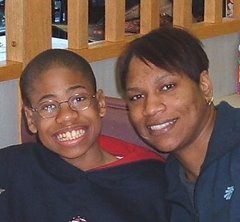Scientists revealed the most extensive findings to date on the genetics of autism, pinpointing two new genetic links that may predispose children to develop the complex brain disorder. The five-year study, led by international researchers from 19 nations, indicated autism had numerous genetic origins rather than a single or a few primary causes. The study incriminated a gene called neurexin 1 involved with glutamate, a brain chemical previously implicated in autism that plays a role in early brain development, as a possible susceptibility gene for autism. A previously unidentified region of chromosome 11 also was implicated. Autism is a spectrum of disorders apparently stemming from genetic and environmental causes. Geneticist Stephen Scherer of the University of Toronto and the Hospital for Sick Children in Toronto said 90 percent of autism may have a genetic basis. child-autism-parent-cafe.com
Click here for article
Wednesday, February 28, 2007
Monday, February 26, 2007
LIVE Webcast – First in New Series “Today’s Topics In Health Disparities”
On Friday, March 2, at 1 p.m. ET, Kaiser will launch a new series of live, interactive webcasts entitled “Today's Topics In Health Disparities,” which will be devoted to addressing a range of issues relating to health and health care disparities in the United States. Each discussion will feature a panel of experts tackling current issues in health disparities and answering questions from webcast viewers. The first in the series, “Is the U.S. Making Progress in Reducing Disparities in Health Care Access and Quality?” will provide an overview of key findings in the 2006 National Healthcare Disparities Report (NHDR), focus attention on evidence showing the areas in which racial and ethnic disparities in health care have narrowed, and discuss interventions that may explain some of the gains achieved. Marsha Lillie Blanton, Kaiser senior advisor on race, ethnicity, and health care will moderate the panel, which will include Carolyn Clancy, M.D., director of the Agency for Healthcare Research and Quality; Reed Tuckson, M.D., senior vice president of Consumer Health and Medical Care Advancement at UnitedHealth Group; and Elena Rios, M.D., M.S.P.H., president and CEO of the National Hispanic Medical Association. Submit questions to TodaysTopics@kaisernetwork.org. child-autism-parent-cafe.com
Click here for info
Click here for info
Tuesday, February 13, 2007
Children's sleep and cognitive functioning
A new study shows that African-American children and children from lower socioeconomic backgrounds fare worse than their counterparts when their sleep is disrupted. African-American and European-American children's performance on cognitive tests was similar when they slept well, the study found. But when sleep was disrupted, African-American children's performance was worse.
"The findings are consistent with the idea that health-related disparities between different groups of American children have important consequences. In the context of these disparities, children are not at equal risk for cognitive difficulties when sleep is disrupted."
child-autism-parent-cafe.com
Click here to info
"The findings are consistent with the idea that health-related disparities between different groups of American children have important consequences. In the context of these disparities, children are not at equal risk for cognitive difficulties when sleep is disrupted."
child-autism-parent-cafe.com
Click here to info
Friday, February 09, 2007
NAA Again Calls for CDC to Declare Autism a National Emergency
The National Autism Association (NAA) is asking again for the Centers for Disease Control and Prevention (CDC) to treat the epidemic of autism among children as a national emergency following the release of the agency’s latest study claiming a new diagnosis rate of one in 150.
“While it’s nice that the CDC has shared these findings with the public, they must move forward with a plan to treat the children suffering with autism now,” said NAA board chair Claire Bothwell. “This agency has yet to answer the question, ‘Why are so many children sick?’ If this were an epidemic of practically any other disease among the children of this country, they would have long since investigated how it could have happened and made earnest attempts to find treatments.”child-autism-parent-cafe.com
.”Click here for info
“While it’s nice that the CDC has shared these findings with the public, they must move forward with a plan to treat the children suffering with autism now,” said NAA board chair Claire Bothwell. “This agency has yet to answer the question, ‘Why are so many children sick?’ If this were an epidemic of practically any other disease among the children of this country, they would have long since investigated how it could have happened and made earnest attempts to find treatments.”child-autism-parent-cafe.com
.”Click here for info
Monday, February 05, 2007
Autism diet gets a closer look
Dubbed by some as the "autism diet," it is a gluten- and casein-free way of eating, often used by people diagnosed with celiac disease. Gluten products such as wheat, rye and barley are eliminated, as are dairy products, which contain the protein casein. Why the diet seems to work isn't completely understood. One theory involves the "leaky gut syndrome," in which the autistic child's body isn't able to process proteins found in wheat and dairy products. The undigested chunks of protein get into the bloodstream and affect the brain. Another theory is the body's immune system is reacting to the proteins in the body. One study sponsored by the National Institute of Mental Health, at the University of Rochester Medical Center in New York looks at the effects of the diet in autistic children between the ages of 2 1/2 and 4 1/2. It began in 2004 and should be completed in 2008. child-autism-parent-cafe.com
Click for more info
Click for more info
Friday, February 02, 2007
Daily increase in new autism cases in California DD system
"California is now averaging over 9 new cases of full syndrome autism entering California's DD system a day, seven days a week. 78% of the autism population in the system is under the age of 18, with 84% under the age of 22 years old. We currently have 1,223 more 3 to 5 year olds in the system then we have for ALL ages from 22 years old to 62 years old and beyond. 20 years ago in 1987 there were 2,273 persons with autism in California's system. Today, 20 years later, there are 32,809." - Rick Rollens, Co-founder M.I.N.D. Institute UC-Davis
child-autism-parent-cafe.com
Click here for more info
child-autism-parent-cafe.com
Click here for more info
Subscribe to:
Comments (Atom)


